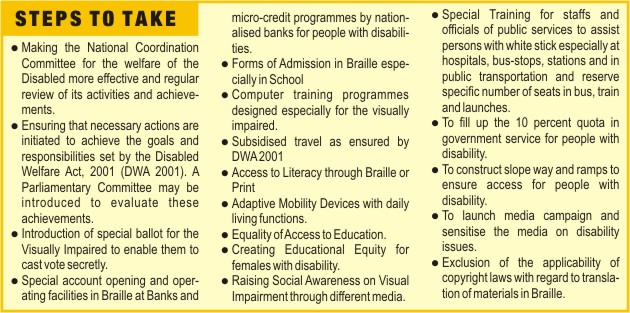Human Rights
An Unacceptable Oversight
Legal rights of the visually impaired
Mubina Asaf
Although the subject of the legal rights of visually impaired has too often been sidelined, it is an issue that is in need of immediate attention. According to the statistics of World Health Organization (WHO), 10 percent of the population of Bangladesh are physically handicapped. About 13 million are physically handicapped in Bangladesh of which about 50 percent are visually impaired. Visual impairment can mean a number of things and doesn't necessarily mean a person is blind. It extends to persons who have impaired vision. Blindness is a public health problem in Bangladesh. The harsh truth is that in every five seconds, one person goes blind and every one minute, a child becomes blind.
Disability, which includes amongst others, visual impairment, has been considered as a vital issue and recognised globally through declaration of United Nations Decade of Disabled Persons during 1983-92. While evaluating the achievement of the Decade, the Asia and the Pacific region fell far behind the targeted plans. This subsequently led to the Proclamation by ESCAP (United Nations Economic and Commission for Asia and the Pacific in with Bangladesh, as a signatory, is committed to achieve the target of the ‘Agenda for Action of the Asia and Pacific Decade of Disabled Persons (1993-2002).’ The major focus of the agenda of the Decade is to enable people with disabilities to achieve equal opportunities so that they can participate in nation building activities.

Furthermore, an act called Bangladesh Protibondhi Kollan Ain 2001, (Disabled Welfare Act, 2001) was passed in the Parliament and published on April 9, 2001 in the Bangladesh Gazette. The Act establishes a national coordination committee (“Committee”) for the welfare of the disabled which includes amongst others Minister for Social Welfare, secrataries and officials of relevant government departments, representatives from private organisations working in the field of welfare for disabled and The Director of National Eye Institute. The Act further requires to enlist all disabled persons and issue identity cards, increase public awareness by mass media coverage, identify children who may become disabled, development of educational materials for the disabled including publication of books in braille system, introduction of sound alert street crossing signals for the visually impaired, subsidised travel at public transports, special programmes on television and special insurance scheme etc.
In stark contrast to First World Nations of the West, where disabled persons are facilitated in every day life and activities and are treated with dignity, we still have to address fundamental concerns of social attitude and stigmas attached to people with phyisical disabilities as a prelimenary step to overcome the disparities between those who are phyically disabled and those who are not.
The Education sector in Bangladesh rarely offers special education and facilities to students with visual impairment. Very few blind or visually impaired persons can get proper education due to a lack of adaptive computer knowledge and skills and insufficient supplies of Braille books and equipment. Even if a blind individual overcomes the obvious obstacles and manages a university degree, there is a serious constraint on job opportunities. Proper training can increase the capability of those who are visually impaired. Such training facilities need to be improved.
 |
The visually-impaired must be given fair opportunities for education and employment. Photo: zahedul i khan |
A blind or visually impaired female is subjugated to the most serious discrimination and even the education sector is not free from this prejudice. Although there are five government schools for the blind in five divisional cities in Bangladesh, there are 30 seats for boys, whereas only 20 seats for girls. There are 64 schools under the integrated programme in 64 district towns. Nonetheless, there are no accomodation facilities for girl students. Therefore, they are deprived of the similar education opportunities and eqaul rights for education. There is only one non-government school for blind girls, which is about to be closed due to different problems. In addition to these various adversities that prevent visually impaired girls to continue their studies, at times they do not receive any support from their families. For those who are permitted schooling and continue to receive higher education, only a few get jobs at different government and non-government organisations.
Discrimination is not restricted to the school and work environment, but inbred in the values of our culture and society. Consequently, too often, visually impaired women cannot get married and if they do get married, their spouse is visually impaired as well. Contrary to this, men who are visually impaired find it easier to get married to someone who does not suffer from visual impairment.
Given these unfortunate circumstances, it is important that the visually impaired or blind have the right to get proper treatment from the State. The Ministry of Health, Ministry of Social Welfare, Ministry of Education, Ministry of Women and Children Affairs and relevant sectors should ensure necessary treatment, education, Braille facilities, rehabilitation and employment to the permanent blind, so that they may be included in mainstream society through self-reliance and development. In order for this to materialise, key initiatives have to be taken and new policies and facilities have to be implemented.
It is the responsibility of those who have been blessed with vision to strive to better the lives of those who do not have the same privilege. As the famous Hellen Keller once stated that “the greatest tragedy in life is people who have sight, but no vision." To have no collective vision would be more unfortunate than to not have been bestowed by sight at all.
The writer is Advocate Supreme Court, Researcher , Institute of Hazrat Mohammad (SAW).
Copyright
(R) thedailystar.net 2010 |
| |
